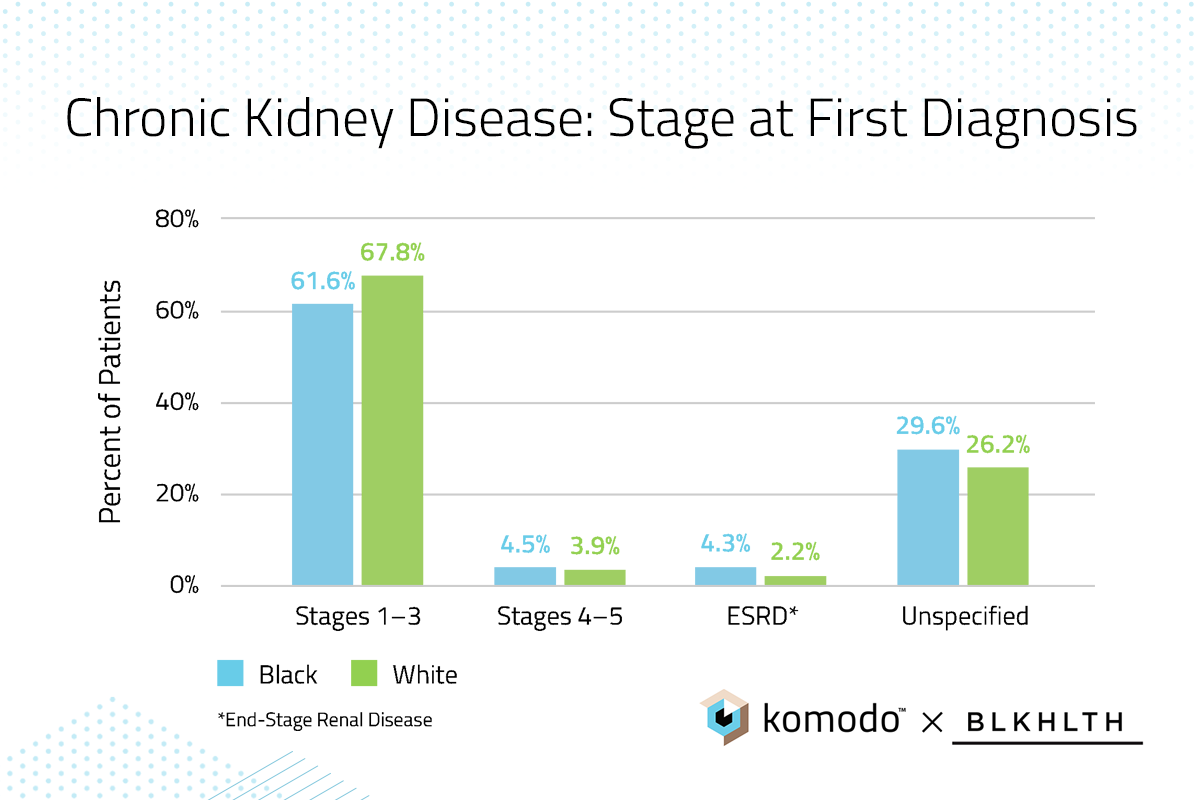Black Americans with Chronic Kidney Disease Experience Later Diagnosis and Worse Outcomes

Similar to diabetes and high blood pressure, chronic kidney disease (CKD) is far more prevalent in Black people than in White people in the United States. Black people comprise 13% of the American population but account for about 35% of CKD cases, making them four times as likely as White people to develop the disease.
As part of our ongoing work to identify and close gaps in care, Komodo Health and BLKHLTH have partnered to analyze disparities in diagnosis, treatment, and outcomes of diseases that disproportionately affect Black communities. We previously reported that a pattern of late diagnosis and delayed treatment results in worse outcomes for Black Americans with colorectal cancer.
For National Kidney Month, we focused on disparities in diagnosis and outcomes of CKD. CKD is characterized by an inability of the kidneys to filter blood properly, with progressive declines in filtration rate over five stages of the disease. At early stages, many pharmaceutical and lifestyle interventions are available to slow the decline in kidney function. But by stage 5, recommended interventions include dialysis and kidney transplantation, both of which have high morbidity and mortality. Without intervention, the kidneys eventually stop functioning entirely and the patient reaches end-stage renal disease (ESRD).
To better understand racial health disparities in CKD, we used Komodo’s Healthcare Map™ of 330 million patient journeys and identified Black and White patients diagnosed with the disease between January 1, 2019, and August 31, 2020. We compared the stages at which they were initially diagnosed and evaluated their risk of progression to ESRD for one year after their CKD diagnosis.
Black patients were diagnosed at later stages of CKD and were twice as likely to be diagnosed at ESRD.
While most patients were diagnosed with CKD at earlier stages 1-3 of disease (61.6% of Black patients and 67.8% of White patients), Black patients were more likely to be diagnosed at later stages of disease. Among Black patients, 4.5% were diagnosed at stages 4-5 and 4.3% at ESRD. Among White patients, 3.9% were diagnosed at stages 4-5 and 2.2% at ESRD.

Black patients were more likely to experience kidney failure within one year of diagnosis.
Black patients diagnosed prior to ESRD were approximately twice as likely as White patients to reach ESRD within one year of diagnosis. 3.3% of Black patients experienced kidney failure within this timeframe compared with 1.7% of White patients.
New CKD diagnoses trailed the 2019 average throughout much of the COVID-19 pandemic.
This trend was true for both Black and White patients. Between February 2020 and July 2021, the number of new cases remained below the pre-pandemic average by 10–40%.
This analysis shows that Black communities bear an undue burden from CKD. Whereas early detection offers a therapeutic window to slow or halt progression, prevent complications, and maintain renal and cardiovascular health, Black patients are more often diagnosed at later stages, leading to worse outcomes and higher healthcare costs. A deeper understanding of the details of these disparities can help in developing strategies to improve equity in our healthcare system.
Read about Komodo Health & BLKHLTH’s  on how late diagnosis and delayed treatments result in worse outcomes for Black colorectal cancer patients.
on how late diagnosis and delayed treatments result in worse outcomes for Black colorectal cancer patients.
To see more articles like this, follow Komodo Health on Twitter and LinkedIn, and visit Insights on our website.






